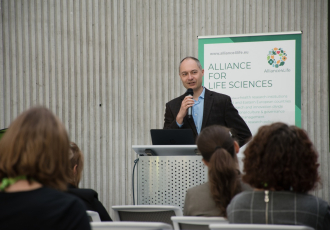22. July 2025
CEITEC Masaryk University (MUNI), as a founding and coordinating member of Alliance4Life – an international alliance of research institutions from Central and Eastern Europe – has co-authored the position paper "Bridging the Gap in Innovation Performance: Alliance4Life’s Vision for an Impactful FP10." The document responds to the ongoing preparations for the Tenth EU Framework Programme (FP10) and highlights the need for a more balanced approach to research and innovation funding across Europe.
Alliance4Life brings together 12 leading research institutions and medical universities from 11 Central and Eastern European (CEE) countries, including CEITEC MUNI. The alliance was established to strengthen scientific excellence in the so-called "Widening countries" (i.e. countries with lower R&I performance – both EU Member States and Horizon Europe associated countries) and to improve their ability to engage in top-level international research collaboration. The newly published position paper, co-authored by CEITEC MUNI, outlines concrete steps to ensure that FP10 not only supports research but also contributes to closing the persistent gap between Western and Eastern Europe.
“European science needs a new paradigm of collaboration—one that goes beyond building connections between East and West, and treats partners from all regions as equals, while directly supporting concrete research activities. That is the only way to strengthen the entire European Research Area,” says Pavel Plevka, Director of CEITEC MUNI. He adds: “Science in Central and Eastern Europe has great potential, but without systemic support for research activities, this potential cannot be fully realised.”
Together with its Alliance4Life partners, CEITEC MUNI has long advocated for transparent, performance-based funding models, talent development, access to infrastructure, and knowledge sharing between European regions. The alliance emphasizes that capacity building alone is not enough – there must be adequate and sustainable research funding in CEE countries, which still face significant underfunding. FP10 should therefore support not only collaboration and knowledge exchange, but also the long-term growth of scientific potential in these regions. The position paper also proposes a differentiated approach to country groups based on progress made, stronger synergies between EU and national programmes, and broader use of tools such as the Seal of Excellence to support high-quality, unfunded projects.
“The next Framework Programme should acknowledge that scientific excellence knows no borders and, given the right conditions, can emerge and thrive anywhere in Europe. The experience of Alliance4Life demonstrates that strategic collaboration, the sharing of best practices, and a focus on institutional change lead to the creation of environments where excellence can flourish. But for these changes to truly take root, we need targeted, sufficient, and predictable funding for science in our region. It is up to the European Commission to help stabilise our top-performing institutions – institutions that share the ambition to compete at the highest level within the European Research Area,” adds Pavel Tomancak, Director of the CEITEC consortium.
The Alliance4Life position paper outlines five main strategic pillars for the future of FP10:
- Talent development: Long-term support for institutions in Widening countries to create attractive environments for young scientists and to welcome experienced researchers with international backgrounds into all career stages.
- Tailored instruments: Flexible tools aligned with the level of institutional readiness, supporting both emerging and more advanced research centres.
- Long-term development: A structured and predictable support system enabling strategic planning and sustained capacity-building over time.
- Synergies with national resources: Better alignment of the Framework Programme with national and structural funds to improve the effectiveness of public investments in science.
- Boosting the role of higher education and its innovation potential: Strengthening links between research, education, and training – particularly through support for structured doctoral programmes and academic leadership development.
CEITEC MUNI fully endorses this vision and believes that such a model for FP10 would not only improve the EU’s global competitiveness, but also uphold its core values – equity, cohesion, and shared progress.
We invite other Czech research and higher education institutions to support this statement and help amplify its key messages by sharing the Alliance4Life position paper within their networks.
The full Alliance4Life position paper is available for download here: Bridging the Gap – Alliance4Life’s Vision for an Impactful FP10.


 Share
Share


